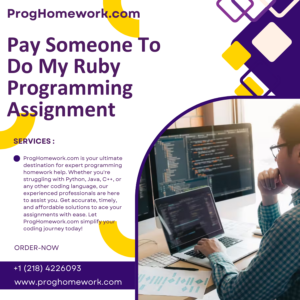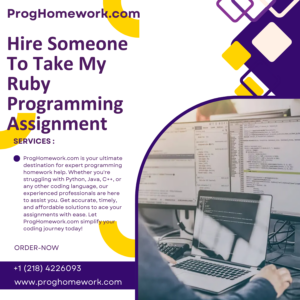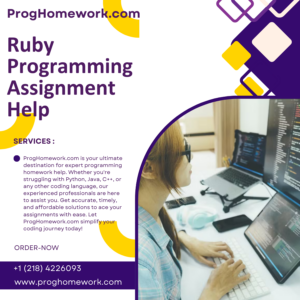Who offers assistance with integrating third-party services into Ruby applications?
Who offers assistance with integrating third-party services into Ruby applications? How can you be involved in a program that is
Ruby is one of the easiest programming languages to pick up, featuring an elegantly straightforward Ruby syntax. It is often taught in web development courses and other computer science-related subjects.
Ruby is an immensely powerful language for creating command-line programs and scripts, thanks to its support for ranges and regular expressions, making it suitable for data collection and server access.
Ruby is a general-purpose programming language focused on productivity and simplicity, featuring English-like syntax with an expansive library of code elements. Ruby was invented in Japan during the mid 1990s by Yukihiro “Matz” Matsumoto and has attracted an ever-increasing user base since.
Ruby offers an abundance of resources for learning its language, such as screencasts, books, in-person classes and developer boot camps. However, learning a new language is time consuming; managing life without adding further burden by conducting extensive research, Coding or debugging is challenging enough!
An online Ruby assignment help service can save both time and money by connecting you with highly-qualified experts who will take on all your programming assignments in Ruby as well as other languages.

Ruby is a dynamic programming language designed for simplicity and productivity. Invented by Yukihiro Matz from parts of his favorite languages, its creator combined them into its signature syntax that balances functional and imperative programming – an excellent choice for web development as evidenced by Apple, GitHub, Twitter, Hulu and ZenDesk all being built using Ruby!
Ruby supports a range of programming paradigms and serves as a general-purpose programming language that runs on UNIX, Macintosh, Windows and DOS-based operating systems. It boasts an expansive library of built-in functions and data structures designed to maximize application performance.
Time complexity is of great importance to Ruby developers. The language offers tools that can assist in debugging and analyzing code; for instance if you want to change an input string into upper or lower case using either upcase or downcase methods respectively. In addition, Performance Ruby allows multiple processors to spawn separate processes, making this useful when performing complex tasks that need multiple processors at the same time.
Ruby is an object-oriented programming language commonly employed by Airbnb, Basecamp, GitHub, Hulu and Shopify – among many others. While learning this new language may prove to be challenging for beginners to programming, professional Ruby assignment help could prove immensely helpful in their efforts to grasp its fundamental concepts.
Ruby programmers typically offer reasonable prices; their rates depend on several factors including project complexity, skill set and industry demand. Furthermore, developers in regions with higher living costs may charge more.
Hire Ruby assignment experts because it will save both time and money, help maintain work-life balance, MemorySafety improve grades and free up more of your time for extracurricular activities, studying for exams or simply relaxing! You will no longer spend as much time researching, writing or coding assignments which frees you up more to enjoy leisure activities such as reading or studying for exams!
Ruby is a widely used programming language used for web application development, testing, and data analysis. Easily learnable, it offers many advantages over competing languages – not to mention opening doors to employment in its industry!
As Ruby is a dynamic language, it is important to keep in mind its dynamism when writing code in it. Dynamic languages may contain bugs; therefore, regular tests of your code are recommended in order to identify errors before they cause serious disruptions in functionality.
Ruby, invented in 1995 by Yukihiro Matsumoto (or Matz) of Japan, is a flexible object-oriented programming language renowned for its human-centric syntax, metaprogramming capabilities and elegant solutions for complex problems. Ruby has since become widely used within the software industry and influenced other programming languages; Automation especially well suited for web application development projects; hence leading to one of the most acclaimed web frameworks, Rails.
Ruby is an easy and fast scripting language suitable for front-end and back-end web development, Deployment thanks to its high-level syntax. Many consider it one of the world’s most beautiful languages.
Ruby is a multiparadigm programming language that seamlessly combines functional and imperative approaches. Its scalable features make working with large libraries simpler while its flexibility make it ideal for developing dynamic applications.

Hire a Ruby developer can be an affordable way for businesses to improve their applications and services. This programming language is used by numerous startups and other businesses alike, and Rails’ framework helps quickly develop applications. Plus, its increased scalability allows it to handle sudden traffic spikes.
Before hiring the ideal Ruby developer, carefully examine their resume and portfolio. While a resume provides a snapshot of a candidate’s qualifications, their portfolio demonstrates their past projects completed.
Yukihiro Matsumoto invented Ruby in 1995 to meet his desire for an object-oriented programming language with greater flexibility and object-orientation. Though often compared with Python and Java, Testing Ruby stands out with its own set of special characteristics that set it apart – such as being interpreted rather than compiled and supporting multiple platforms including Windows, Linux, macOS and UNIX; making it particularly suited to web application development.
Ruby is an intuitive programming language with simple syntax that’s simple to learn but challenging to master, widely used for web development with various applications and widely recognized worldwide as one of the top programming languages.
Ruby offers English-like syntax and runs on most operating systems – Mac, Windows, UNIX and DOS alike. Ruby supports multiple programming paradigms while providing code readability as its top priority. In addition, its object-oriented approach gives users greater freedom in terms of flexibility.
When hiring someone to complete your Ruby programming assignment on time, DataStructures it’s essential that they find someone with expertise who can complete it promptly. Timely completion is essential for a successful project and can be achieved by setting realistic goals and eliminating distractions such as emails. Setting specific times to check email or messages also improves concentration and efficiency allowing more efficient use of time while speeding up completion times and productivity levels.
Ruby is a general-purpose, object-oriented programming language that supports multiple programming paradigms. This flexibility enables developers to select the approach most suitable for a project; its descriptive syntax makes it easy to read and comprehend; its metaprogramming capability allows code that modifies itself or other parts of a program at runtime; metaprogramming support allows code which changes itself over time as part of its capabilities; support for metaprogramming provides developers with ways to write code that modifies itself at runtime – among many other features of its capabilities!
Python’s ability to handle large volumes of data while providing a high level of abstraction from computer details make it an excellent choice for web development, integration scripts, and other business requirements. Unfortunately, mastering it takes considerable time and effort – something students may find daunting if it is part of an elective course or requirement unrelated to their career goals.
There are online services that offer students a helping hand in getting the grades they deserve. With expert writers equipped with knowledge and experience to complete even the most complex assignments, Recursion these services ensure quality with affordability to provide help for any budget.
When choosing a programming assignment help provider, customer service should always come first. A great company will have a team of experts available to answer any queries that arise and deliver quality work in a timely fashion – keeping you on the path towards passing courses successfully and earning better grades than before!
Ruby is an object-oriented computer language designed to be flexible in its approach to problem-solving. Coders can freely update essential parts of a program without compiling into machine-readable instructions; its structure uses blocks which allows developers to assign functionality across sections.
One reason that makes Python such a popular web development language is its versatility: it can be used to build web applications, Interfaces servers and perform data processing functions – perfect for start-ups as it’s easier than other languages to learn and use.
Ruby is an elegant programming language designed to support multiple paradigms and its flexible nature makes it a popular choice for web development projects.
Scholars sometimes encounter difficulty understanding the syntax and other technical aspects of programming languages like C or Java, Semantics making completing assignments challenging and sometimes requiring expert assistance for successful completion. They frequently look for expert assistance.

Object-oriented programming (OOP) is the methodology by which code structures are represented as objects with properties and behaviors, linked through interfaces that communicate between them. These interfaces can then be changed as necessary as changes occur within a system; this facilitates better data organization as well as greater code reuse over time, saving both time and money over the long haul.
Ruby is a dynamic language that strikes an equilibrium between object-oriented and imperative programming, thanks to the efforts of Yukihiro Matz in combining parts of his favorite languages into it for creating an environment which combines functionality and declarativity.
Ruby offers high levels of abstraction and supports recursion. Furthermore, Paradigms there are various libraries to make using it more user-friendly for newcomers. Our Ruby assignment help service can help you reclaim time spent researching and coding for assignments to maintain a healthier work-life balance by saving time spent researching and coding assignments, giving you back time for study exams or extracurricular activities, or just relaxing!
Arrays, hashes and sets are essential tools for organizing data in Ruby programs. Each data structure excels at performing specific tasks; by understanding their capabilities more fully you can write more efficient code. Our experts are well versed in all these algorithms and can assist with your Ruby assignments.
Use of Ruby programming structures can greatly simplify and accelerate your code, making it faster to read and execute. Big-O notation (measure of worst case time and space requirements as input size grows) can be used to compare performance of these structures.
Balanced binary trees offer O(1) access time while unbalanced ones take O(n). Both structures make great storage and iteration structures that support ranges and regular expressions, Libraries plus have built-in functions to manipulate them easily for quicker learning curves.
Ruby is known for its easy readability, making it a popular choice when developing web applications. But the language can be more complex than many realize – for instance it utilizes metaprogramming, which enables code to manipulate other codes; this may cause problems when writing more advanced applications.
Ruby relies heavily on frameworks, pre-written sets of code that help developers create applications quickly. While using frameworks can speed up development time, programmers must understand how they function to use them correctly.
Algorithms are step-by-step procedures designed to solve problems or perform calculations. Algorithms are an integral component of computer programming and Ruby comes equipped with its own set. At Programming Assignment Help, our experts specifically discuss dynamic programming as a common algorithm design approach; Frameworks this technique has applications across numerous disciplines and is particularly helpful when working with large datasets.
Ruby offers many advanced features, such as object-oriented programming, an in-depth class system and flexible data structures. These features make writing complex programs and applications much simpler but may prove challenging for new programmers to learn.
Understanding Ruby variables is one of the key challenges. Although Ruby allows you to set variables by name, convention requires local variables begin with lowercase letters separated by underscores and can call methods on Lvalues in order to alter how they look.
Mastersing Ruby computer language is essential to succeeding in software engineering and other related disciplines, Optimization yet mastery of it can be daunting for those without access to resources or time. That is where online Ruby assignment help services come in; these professional services provide scholars with professional assistance and expert guidance in completing their assignments successfully.
Who offers assistance with integrating third-party services into Ruby applications? How can you be involved in a program that is
Where can I hire a Ruby developer for assistance with ticketing systems? In case you are looking for the ability
Where can I find assistance with implementing recommendation systems for music streaming services in Ruby programming projects? Also, if there’s
How do I evaluate the reliability of a service that offers assistance with Ruby programming homework? Results: What I’ve learned
How do I hire someone to handle my Ruby programming homework? There are a few common questions regarding hiring someone
Can I pay someone to provide assistance with setting up and configuring secure containerization and orchestration platforms for my Ruby
Where can I find help with implementing recommendation systems for home and interior design in Ruby programming projects? I’ve been
Who provides assistance with designing and implementing RESTful APIs for Ruby programming projects? It creates your own RESTful REST API.
How to evaluate the proficiency of someone offering to do my Ruby programming homework? I have a bunch of Ruby
Can I find someone to provide guidance on implementing secure data validation and sanitization techniques for my Ruby programming applications?

Order now for top-notch programming services—fast, reliable, and tailored to your needs! Get expert coding solutions today!
ProgHomework offers top-notch programming assignment help with accuracy, affordability, and timely delivery.

![]()

Copyright © All rights reserved | Prog Homework